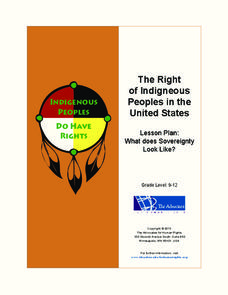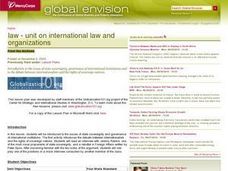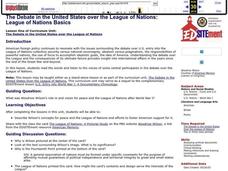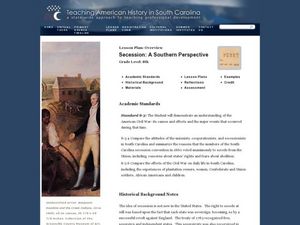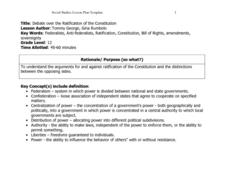Curated OER
The Federalist Debates: Balancing Power Between State and Federal Governments
Students examine the pros and cons of state sovereignty vs. federalism, as argued by the Founding Fathers. They identify the basic positions of each side, complete a worksheet, and write a persuasive essay arguing for Jefferson or Hamilton.
Advocates for Human Rights
The Right of Indigneous Peoples in the United States
The sovereignty of U.S. Native American nations is the focus of a resource that asks class members to compare the Right to Self-Determination in the UN Declaration on the Rights of Indigenous Peoples with a fact sheet that details the...
National Endowment for the Humanities
Lesson 1: The United States Confronts Great Britain, 1793–1796
After the Revolutionary War, the success of the United States was far from guaranteed. Foreign powers coveted the new land, and Great Britain challenged American sovereignty. Learners consider the challenges facing the new nation using...
National Endowment for the Humanities
Lesson 2: The United States, France, and the Problem of Neutrality, 1796–1801
While the French Revolution could be considered inspired by the American Revolution, it created thorny problems for the new United States. Should the United States get involved and be drawn into a European drama? Was the US strong...
Curated OER
The Kansas-Nebraska Act of 1854: Popular Sovereignty and the Political Polarization over Slavery
Why did Stephen Douglas support the Kansas-Nebraska Act of 1854? Why did Abraham Lincoln oppose it? Young historians examine how the Kansas-Nebraska Act of 1854 affected the political balance between free and slave states and explore how...
Curated OER
Popular Sovereignty Under the Kansas-Nebraska Act
Seventh graders examine the implications of the Kansas-Nebraska Act. In this slavery lesson, 7th graders examine a map of 1820 America and discuss the balance of power implied by the map. Students then read Stephen Douglas's speech on...
Curated OER
International Law and Organizations
Young scholars conduct research and debate some of the conflicting viewpoints surrounding state sovereignty vs. the governance of international institutions. They read interviews and participate in role-plays.
Curated OER
A House Dividing: The Growing Crisis of Sectionalism in Antebellum America
High schoolers explore the debates over American slavery and the power of the American federal government for the first half of the 19th century and how the regional economies and political events produced a widening split between the...
Student Handouts
Constitutional Principles
Keep track of constitutional principles with a graphic organizer. Pupils define, describe the origins of, and note down the location of the following terms: checks and balances, federalism, individual rights, limited government, popular...
Curated OER
The Coming of Independence
Provide your learners with an opportunity to show what they know. Have them answer 10 questions on colonial America, 13 Colonies, colonial legislature, and popular sovereignty. There are 5 true/false and 5 multiple choice questions.
Curated OER
The Debate in the United States over the League of Nations
Students investigate Woodrow Wilson's ideas for peace through the League of Nations. They examine how he attempted to encourage American support for the League and the opposition to it that was found in the Senate.
Curated OER
The Debate in the United States over the League of Nations: League of Nations Basics
Students examine Woodrow Wilson's ideas for peace and the League of Nations. They examine how he garnered supported of it by looking at images and discussing their context.
Curated OER
The Debate in the United States over the League of Nations: League of Nations Basics
Students describe Woodrow Wilson's concepts for peace and the League of Nations and efforts to foster American support for it.
National Endowment for the Humanities
The Debate in the United States over the League of Nations: Five Camps: From Voices of Consent to Voices of Dissent
Learners explore and discuss Woodrow Wilson's concepts for peace and the League of Nations. They understand efforts made to foster American support for the League and discuss the opposition shown in the Senate.
Curated OER
State Sovereignty and the Ethics of Intervention
Young scholars study the history, ethics, politics and law of state sovereignty and its limits. In this investigative lesson students listen to a lecture, discuss then complete a few assignments.
Curated OER
The Federalist Debates: Balancing Power Between State and Federal Governments
Students explain the basic positions of the Federalists and the Anti-Federalists. They chart the differences and similarities between state and federal governments. They write a persuasive essay in response to an open-ended question.
Curated OER
Secession: A Southern Perspective
Eighth graders determine how secession impacted South Carolina as well as the United States. In this American Civil War lesson, 8th graders examine selected primary and secondary sources in order to study the state's sovereignty and the...
iCivics
Tribal Government: High School
Did you know there are 567 federally recognized American Indian and Native Alaskan tribes and villages in the United States alone? The resource helps break down the complexities of many different tribal societies to explain the concept...
Curated OER
American Indian Tribal Sovereignty
Seventh graders examine the relationship among the governments of the sovereign American Indian Nations in Utah, the State of Utah, and the U.S. They list the objectives of the Office of Indian Affairs and examine their purpose.
Curated OER
Sectionalism and the Kansas-Nebraska Act
Learners define and discuss sectionalism and popular sovereignty, analyze impact of popular sovereignty in creation of state of Kansas, compare issues in territorial Kansas to current politically divisive topic, and evaluate primary...
Curated OER
Citizenship Worksheet 2 - A Government of Laws
In this citizenship and government laws worksheet, students identify what the United States government provides for its citizens, the foundations of that government, the principles of the Constitution, any amendments to the Constitution,...
School Improvement in Maryland
Are These Human Right Violations?
Using the Declaration of Human Rights and the United States Constitution as reference tools, class members examine 14 scenarios to decide if the situation represents a violation of human rights, and if these same rights are protected by...
Curated OER
Debate over the Ratification of the Constitution
Twelfth graders discuss the creation of the United States, the Articles of Confederation and the Constitution. Through a class debate, role-playing Federalists and Anti-federalists, they identify the reasons for and against ratification...
Curated OER
Popular Sovereignty and the Lecompton Constitution
Students explore the purpose of the Lecompton Constitution. In this United States History lesson, students read several articles then complete several activities to reinforce their reading, such as a cause and effect worksheet,...



